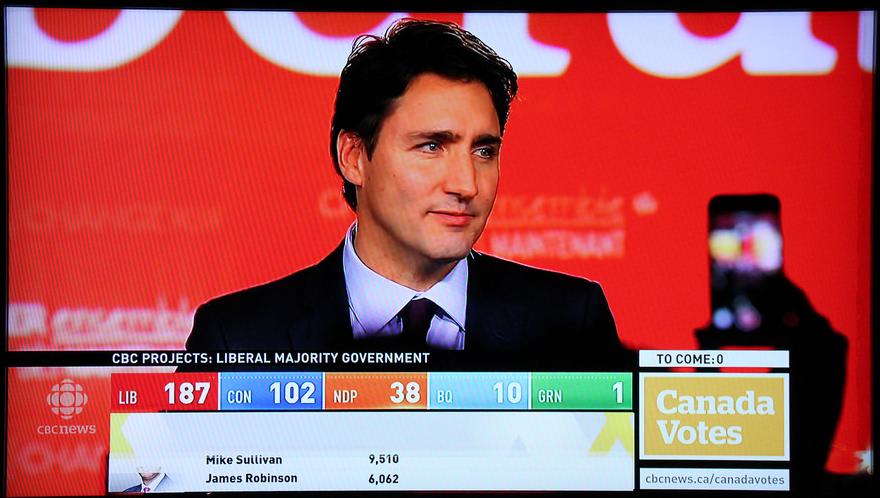Back in 2007, I thought, for sure, Ontario’s referendum on electoral reform would pass.
I was just starting my fourth year at Ryerson and was a vice-president at the student union. We put all our effort into campaigning for electoral reform. Everyone we talked to agreed with the recommendation of the Constituency Assembly. We were all down with MMP (mixed-member proportional). Everyone we knew would be voting to change the system. It was a sure bet!
The referendum, of course, did not pass. Aside from the student movement, there was no popular campaign that did the broad organizing necessary to convince people to take the plunge into a new electoral system.
The Liberals effectively buried the referendum, ensuring that it would be years before they’d have to deal with the debate again. And, years later, it’s never come back.
Federally, though, a majority of Canadians elected politicians who represent parties that want Canada to ditch the first-past-the-post system (FPTP). Maybe this time, we’ll get some reform.
The Liberals have not stated which system they favour. Read Dale Smith’s summary of why the Liberals have made the focus of these town halls to be on “principles” rather than the mechanics of which new voting system they prefer here.
The Trudeau Liberals are masters of public relations. They’re slippery, they’re careful and, considering the internal hole that they recently climbed out of, honestly might not be sure which direction to take. While I doubt the new electoral system will come from a random comment at the town hall in Elmira, Ontario, it is possible that they are hoping that these town halls will be the magnetic pull they seek to stop their compass from spinning.
The Liberals have started the process to make potentially excellent changes. This is fertile ground for progressive voices to push for our favoured system.
So: which electoral system are progressive forces organizing around?
The NDP doesn’t say. They instead rely on rhetoric that is mostly vacant and mirrors the same kind of thing that the Liberals are saying: “We will hold the government to its promise of making 2015 the last election held under our unfair voting system. Town halls held by NDP MPs across the country confirmed that the time has come to adopt a system where every vote counts.”
Neither does Fair Vote Canada, a social movement organization that has been fighting for electoral reform for years. They call for a consultation process and then for the Liberals to “Implement the model in time to Make Every Vote Count in the 2019 election.” They want all votes to be made “equal and effective” but don’t say what that actually means. At some level, the most effective votes are the votes for the prevailing candidate. Some of us will always have to vote for the losers. Why be coy with what they want?
Unions are playing a similar game. Unifor offers its members ways to get involved but doesn’t say what they should advocate for. The Canadian Labour Congress calls for “some form of proportional representation” and then explains the differences between MMP and Single Transferrable Vote (the system considered twice in referendums in British Columbia). But again, doesn’t argue for one or the other.
Even the Every Voter Counts coalition, representing more than 60 social movement and labour organizations refuses to take a position on what form of proportional representation should be adopted. Instead, it calls for consultation with “experts” to come up with the best solution.
Electoral reform makes for fun armchair politics. But when we’re talking about changing something so fundamental as our electoral system, it’s easy to see why people get nervous when they’re presented with the options. It’s complicated, and increasingly so when we’re talking about all the ways in which the system might be reformed.
But time is running out, and if we let the Liberals to their own devices, we lose the chance to push for the best option. Progressive organizations need to pick a system and fight for it rather than getting caught up in rhetoric that stealthily ignores the final product.
For me, the clear winner is MMP. I think it offers the best mix of options for Canadians. The arguments made by Ontario’s Constituency Assembly in 2007 in favour of MPP were compelling and should be used today. I suspect it’s the favoured system for a majority organizations fighting for electoral reform.
It is for CUPE National, whose electoral reform website explicitly juxtaposes MMP with FPTP. There’s even a nice infographic.
It probably is for the NDP too, as indicated in this podcast by Alexandre Boulerice.
So why aren’t these organizations driving a campaign in favour of MMP, or anything more specific than something that’s “more fair?”
If the 2007 taught me anything it’s that explaining the new system is more important than denigrating the old. The Liberal town halls need to hear that Canadians want MMP, or whichever system progressives can reach a consensus on. There’s no time to lose.
Otherwise, we risk allowing the Liberals to do with these town halls what they will: perhaps argue for ranked ballots or worse, push off the decision for another election that they can use as a way to win a second mandate.
Electoral reform isn’t a panacea. Our democracy is broken for a variety of complex issues unrelated to FPTP, but FPTP certainly needs to go. Using this issue to form a broad consensus for progressives on what we want can help propel other ideas forward that we need implemented. If we can’t get this right, we’ll miss our change for a generation or more.
Read rabble’s series on why Canada must adopt Proportional Representation here.
Like this article? rabble is reader-supported journalism. Chip in to keep stories like these coming.



